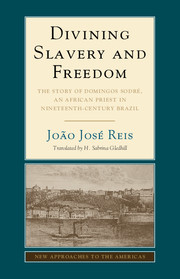 Divining Slavery and Freedom
Divining Slavery and Freedom Book contents
- Frontmatter
- Dedication
- Contents
- Preface
- Abbreviations
- Map
- 1 Cops and Candomblé in Domingos Sodré's Day
- 2 From an African in Onim to a Slave in Bahia
- 3 Domingos Sodré, Diviner
- 4 Witchcraft and Slavery
- 5 Witchcraft and Manumission
- 6 Meet Some Friends of Domingos Sodré
- 7 Domingos Sodré, Ladino Man of Means
- Epilogue
- Timeline of Domingos Sodré's Life
- Glossary
- Appendix 1 Domingos Sodré's Last Will and Testament (1882)
- Appendix 2 Domingos' Manumission and Manumissions Granted by Him
- Appendix 3 Delfina's Petition Guaranteeing Her Mental Health
- Illustration and Map Credits
- Bibliography
- Acknowledgments
- Name Index
- Subject Index
Preface
Published online by Cambridge University Press: 05 May 2015
- Frontmatter
- Dedication
- Contents
- Preface
- Abbreviations
- Map
- 1 Cops and Candomblé in Domingos Sodré's Day
- 2 From an African in Onim to a Slave in Bahia
- 3 Domingos Sodré, Diviner
- 4 Witchcraft and Slavery
- 5 Witchcraft and Manumission
- 6 Meet Some Friends of Domingos Sodré
- 7 Domingos Sodré, Ladino Man of Means
- Epilogue
- Timeline of Domingos Sodré's Life
- Glossary
- Appendix 1 Domingos Sodré's Last Will and Testament (1882)
- Appendix 2 Domingos' Manumission and Manumissions Granted by Him
- Appendix 3 Delfina's Petition Guaranteeing Her Mental Health
- Illustration and Map Credits
- Bibliography
- Acknowledgments
- Name Index
- Subject Index
Summary
At 4:30 P.M. on July 25, 1862, a Friday, an African freedman named Domingos Pereira Sodré was arrested in his home in Salvador, the capital of Bahia, then a province in northeastern Brazil. He had been personally reported to the chief of police by a customs officer who accused him of receiving goods that slaves had stolen from their masters as payment for his divining sessions and for “witchcraft.” His accuser, whose charges were immediately investigated, was himself a slave owner and one of the alleged victims. Candomblé – the term that the police chief used to describe what was going on in the African' home– was already in vogue at the time to denote religious beliefs and practices of African origin, or purported to be, as well as the place of worship. I will use the same broader meaning of the term in this book. Candomblé, it should be said from the start, is a spirit possession religion primarily based in Bahia, but also found in different parts of Brazil. It ranks as one of the most popular Afro-Brazilian religions, which also include Umbanda, Batuque, and Xangô, terms that are sometimes also used to refer to Candomblé.
More than twenty years ago, Icame across the first documents pertaining to Domingos Sodré's arrest, which consist of a number of official letters exchanged between the chief of police, Antônio de Araújo Freitas Henriques, and the subdelegado (deputy chief constable) for the parish of São Pedro, Pompílio Manoel de Castro, where Domingos Sodré lived. These sources led me to others that enabled me to broaden the focus on the incident that took place in 1862. Iwent after information regarding the African freedman accused of witchcraft and theft and unearthed a great deal. He was born in Lagos, in what is now Nigeria, and was captured and sold to transatlantic slave traders under unknown circumstances.
- Type
- Chapter
- Information
- Divining Slavery and FreedomThe Story of Domingos Sodré, an African Priest in Nineteenth-Century Brazil, pp. xi - xviPublisher: Cambridge University PressPrint publication year: 2015
